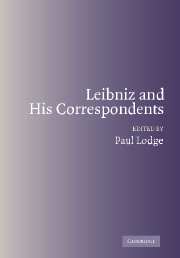Book contents
- Frontmatter
- Contents
- Contributors
- Abbreviations
- Acknowledgments
- 1 Introduction
- 2 Leibniz and His Master: The Correspondence with Jakob Thomasius
- 3 A Philosophical Apprenticeship: Leibniz's Correspondence with the Secretary of the Royal Society, Henry Oldenburg
- 4 The Leibniz–Foucher Alliance and Its Philosophical Bases
- 5 Leibniz to Arnauld: Platonic and Aristotelian Themes on Matter and Corporeal Substance
- 6 Leibniz and Fardella: Body, Substance, and Idealism
- 7 Leibniz's Exchange with the Jesuits in China
- 8 Leibniz's Close Encounter with Cartesianism in the Correspondence with De Volder
- 9 “All the time and everywhere everything's the same as here”: The Principle of Uniformity in the Correspondence Between Leibniz and Lady Masham
- 10 Idealism Declined: Leibniz and Christian Wolff
- 11 On Substance and Relations in Leibniz's Correspondence with Des Bosses
- 12 “[…] et je serai tousjours la même pour vous”: Personal, Political, and Philosophical Dimensions of the Leibniz–Caroline Correspondence
- References
- Index
3 - A Philosophical Apprenticeship: Leibniz's Correspondence with the Secretary of the Royal Society, Henry Oldenburg
Published online by Cambridge University Press: 02 September 2009
- Frontmatter
- Contents
- Contributors
- Abbreviations
- Acknowledgments
- 1 Introduction
- 2 Leibniz and His Master: The Correspondence with Jakob Thomasius
- 3 A Philosophical Apprenticeship: Leibniz's Correspondence with the Secretary of the Royal Society, Henry Oldenburg
- 4 The Leibniz–Foucher Alliance and Its Philosophical Bases
- 5 Leibniz to Arnauld: Platonic and Aristotelian Themes on Matter and Corporeal Substance
- 6 Leibniz and Fardella: Body, Substance, and Idealism
- 7 Leibniz's Exchange with the Jesuits in China
- 8 Leibniz's Close Encounter with Cartesianism in the Correspondence with De Volder
- 9 “All the time and everywhere everything's the same as here”: The Principle of Uniformity in the Correspondence Between Leibniz and Lady Masham
- 10 Idealism Declined: Leibniz and Christian Wolff
- 11 On Substance and Relations in Leibniz's Correspondence with Des Bosses
- 12 “[…] et je serai tousjours la même pour vous”: Personal, Political, and Philosophical Dimensions of the Leibniz–Caroline Correspondence
- References
- Index
Summary
Still scarred by the ravages of war and politically disunited, Germany at the time of the young Leibniz was in danger of losing touch with philosophical and scientific developments elsewhere in Europe. In a letter written in August 1670 to the diplomat Johann Christian von Boineburg (1622–72) who since his reconciliation with Johann Philipp von Schönborn (1605–73) some two and a half years earlier was once more in the service of the Elector of Mainz, Henry Oldenburg (1618?–77) expresses his concerns over what he sees as the deplorable state of philosophy in the country of his birth:
Would that those who excel in litigation and in the sciences in Germany make their contributions towards the restoration and perfection of philosophy with a better will than they have shown hitherto, and would eagerly imitate in this the example of England, France, and Italy herself in turning to experiments. What we are about is no task for one nation or another singly. It is needed that the resources, labors, and zeal of all regions, princes, and philosophers be united, so that this task of comprehending nature may be pressed forward by their care and industry.
(OCH VII, 107–8/108–9)Oldenburg's concerns were not without justification. The new, mechanistic world picture had, after all, found only few adherents, most notably Erhard Weigel (1625–99) in Jena, and the creation of a focal point of scientific activity such as the Royal Society in London or the Académie Royale des Sciences in Paris was still a long way off.
- Type
- Chapter
- Information
- Leibniz and his Correspondents , pp. 47 - 73Publisher: Cambridge University PressPrint publication year: 2004
- 3
- Cited by

